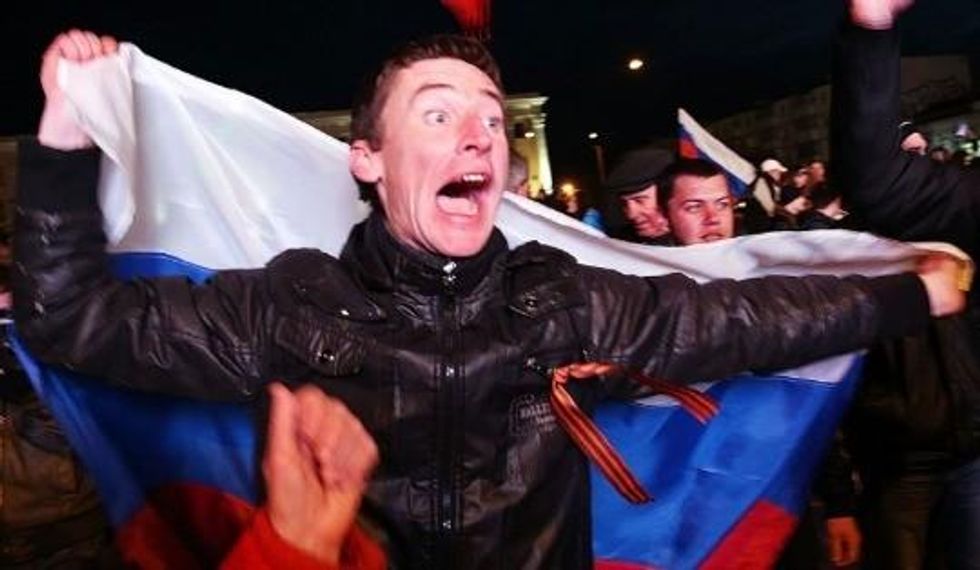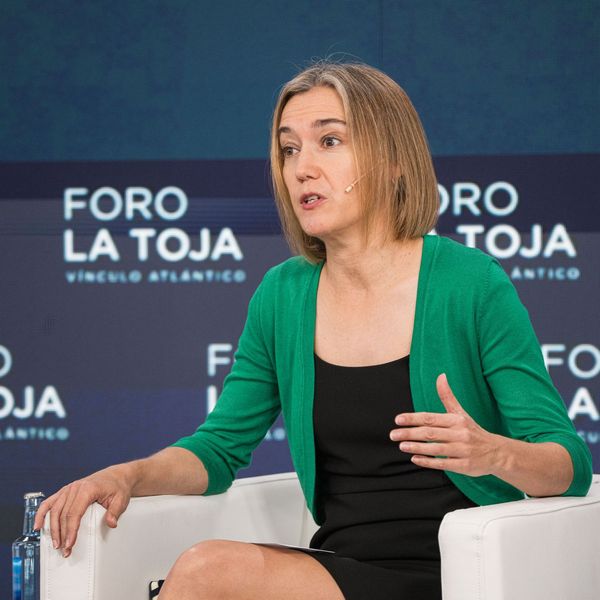US, EU Set Sanctions as Crimea Moves Fast to Join Russia
Kiev responds with military mobilization as US and EU call Sunday's vote "illegimitate" and calculate new sanctions

The Guardian reports:
The US and the European Union have retaliated over the Crimea referendum by targeting sanctions against Russians and Ukrainians.
European foreign ministers imposed EU-wide sanctions on Monday against 21 Russian and Ukrainian officials linked to unrest in Crimea. Washington followed up an hour later with a list of its own, targeting seven top Russian government officials and politicians and four Crimea-based separatist leaders accused of undermining the "democratic processes and institutions in Ukraine".
Barack Obama is to visit Europe next week for discussion of the crisis with allies. Speaking to journalists at the White House, he said the new sanctions increase the costs on the Russian government for its actions
"If Russia continues to interfere in Ukraine, we stand ready to impose further sanctions," Obama said.
EARLIER:
Members of Crimea's regional parliament are on their way to Moscow on Monday in order to discuss with Russian leaders the next steps toward finalizing their formal secession from Ukraine following a referendum on Sunday in which citizens voted overwhelmingly to join the Russian Federation and rejecting ties to what they see as an "illegitimate" government in Kiev.
In an announcement on its website, the newly declared independent government of Crimea announced it has "made a proposal to the Russian Federation to admit the Republic of Crimea as a new subject with the status of a republic."
Crimea's new prime minister, Sergei Aksyonov, told reporters that the results, in which more than 95% voted to re-join Russia, "speak for themselves."
The response from Kiev, however, reveals the contentious nature of the developments as the interim government there called up 20,000 reservists from the Ukraine military and declared another 20,000 to duty for what is being called a new "national guard" force.
European governments and the U.S., which have repeatedly promised not to accept the result of the referendum, are now planning their response. EU officials are meeting in Brussels on Monday to discuss possible sanctions against Moscow for what they charge is illegal Russian interference.
In Washington late Sunday night, President Obama again spoke with Russian President Vladimir Putin over the crisis. According to White House officials, Obama warned Putin that Crimea's independence "would never be recognized by the United States and the international community." Though Obama made clear no military options were on the table and a reiterated his desire for a diplomatic solution, he again warned Putin that the U.S. was "prepared to impose additional costs on Russia for its actions."
Putin is scheduled to speak about the latest developments on Tuesday.
In the meantime, and despite a protest march in opposition to the situation in Crimea on the streets of Moscow over the weekend, Russian lawmakers in the Federation Council voiced support for the region with historic ties to Russia returning as a new republic.
As was evidenced in celebrations on Sunday night in cities across Crimea, those eager to rejoin Russia were jubilant. For those wary of returning to Moscow's sphere, including ethnic Tatars on the peninsula with an uneasy history of living under Soviet rule and those sympathetic to the new government that has seized power in Kiev, the days ahead remain full of uncertainty.
Updates and commentary continue on Twitter:
Tweets from https://twitter.com/commondreams/on-ukraine
________________________________________
An Urgent Message From Our Co-Founder
Dear Common Dreams reader, The U.S. is on a fast track to authoritarianism like nothing I've ever seen. Meanwhile, corporate news outlets are utterly capitulating to Trump, twisting their coverage to avoid drawing his ire while lining up to stuff cash in his pockets. That's why I believe that Common Dreams is doing the best and most consequential reporting that we've ever done. Our small but mighty team is a progressive reporting powerhouse, covering the news every day that the corporate media never will. Our mission has always been simple: To inform. To inspire. And to ignite change for the common good. Now here's the key piece that I want all our readers to understand: None of this would be possible without your financial support. That's not just some fundraising cliche. It's the absolute and literal truth. We don't accept corporate advertising and never will. We don't have a paywall because we don't think people should be blocked from critical news based on their ability to pay. Everything we do is funded by the donations of readers like you. Will you donate now to help power the nonprofit, independent reporting of Common Dreams? Thank you for being a vital member of our community. Together, we can keep independent journalism alive when it’s needed most. - Craig Brown, Co-founder |

The Guardian reports:
The US and the European Union have retaliated over the Crimea referendum by targeting sanctions against Russians and Ukrainians.
European foreign ministers imposed EU-wide sanctions on Monday against 21 Russian and Ukrainian officials linked to unrest in Crimea. Washington followed up an hour later with a list of its own, targeting seven top Russian government officials and politicians and four Crimea-based separatist leaders accused of undermining the "democratic processes and institutions in Ukraine".
Barack Obama is to visit Europe next week for discussion of the crisis with allies. Speaking to journalists at the White House, he said the new sanctions increase the costs on the Russian government for its actions
"If Russia continues to interfere in Ukraine, we stand ready to impose further sanctions," Obama said.
EARLIER:
Members of Crimea's regional parliament are on their way to Moscow on Monday in order to discuss with Russian leaders the next steps toward finalizing their formal secession from Ukraine following a referendum on Sunday in which citizens voted overwhelmingly to join the Russian Federation and rejecting ties to what they see as an "illegitimate" government in Kiev.
In an announcement on its website, the newly declared independent government of Crimea announced it has "made a proposal to the Russian Federation to admit the Republic of Crimea as a new subject with the status of a republic."
Crimea's new prime minister, Sergei Aksyonov, told reporters that the results, in which more than 95% voted to re-join Russia, "speak for themselves."
The response from Kiev, however, reveals the contentious nature of the developments as the interim government there called up 20,000 reservists from the Ukraine military and declared another 20,000 to duty for what is being called a new "national guard" force.
European governments and the U.S., which have repeatedly promised not to accept the result of the referendum, are now planning their response. EU officials are meeting in Brussels on Monday to discuss possible sanctions against Moscow for what they charge is illegal Russian interference.
In Washington late Sunday night, President Obama again spoke with Russian President Vladimir Putin over the crisis. According to White House officials, Obama warned Putin that Crimea's independence "would never be recognized by the United States and the international community." Though Obama made clear no military options were on the table and a reiterated his desire for a diplomatic solution, he again warned Putin that the U.S. was "prepared to impose additional costs on Russia for its actions."
Putin is scheduled to speak about the latest developments on Tuesday.
In the meantime, and despite a protest march in opposition to the situation in Crimea on the streets of Moscow over the weekend, Russian lawmakers in the Federation Council voiced support for the region with historic ties to Russia returning as a new republic.
As was evidenced in celebrations on Sunday night in cities across Crimea, those eager to rejoin Russia were jubilant. For those wary of returning to Moscow's sphere, including ethnic Tatars on the peninsula with an uneasy history of living under Soviet rule and those sympathetic to the new government that has seized power in Kiev, the days ahead remain full of uncertainty.
Updates and commentary continue on Twitter:
Tweets from https://twitter.com/commondreams/on-ukraine
________________________________________

The Guardian reports:
The US and the European Union have retaliated over the Crimea referendum by targeting sanctions against Russians and Ukrainians.
European foreign ministers imposed EU-wide sanctions on Monday against 21 Russian and Ukrainian officials linked to unrest in Crimea. Washington followed up an hour later with a list of its own, targeting seven top Russian government officials and politicians and four Crimea-based separatist leaders accused of undermining the "democratic processes and institutions in Ukraine".
Barack Obama is to visit Europe next week for discussion of the crisis with allies. Speaking to journalists at the White House, he said the new sanctions increase the costs on the Russian government for its actions
"If Russia continues to interfere in Ukraine, we stand ready to impose further sanctions," Obama said.
EARLIER:
Members of Crimea's regional parliament are on their way to Moscow on Monday in order to discuss with Russian leaders the next steps toward finalizing their formal secession from Ukraine following a referendum on Sunday in which citizens voted overwhelmingly to join the Russian Federation and rejecting ties to what they see as an "illegitimate" government in Kiev.
In an announcement on its website, the newly declared independent government of Crimea announced it has "made a proposal to the Russian Federation to admit the Republic of Crimea as a new subject with the status of a republic."
Crimea's new prime minister, Sergei Aksyonov, told reporters that the results, in which more than 95% voted to re-join Russia, "speak for themselves."
The response from Kiev, however, reveals the contentious nature of the developments as the interim government there called up 20,000 reservists from the Ukraine military and declared another 20,000 to duty for what is being called a new "national guard" force.
European governments and the U.S., which have repeatedly promised not to accept the result of the referendum, are now planning their response. EU officials are meeting in Brussels on Monday to discuss possible sanctions against Moscow for what they charge is illegal Russian interference.
In Washington late Sunday night, President Obama again spoke with Russian President Vladimir Putin over the crisis. According to White House officials, Obama warned Putin that Crimea's independence "would never be recognized by the United States and the international community." Though Obama made clear no military options were on the table and a reiterated his desire for a diplomatic solution, he again warned Putin that the U.S. was "prepared to impose additional costs on Russia for its actions."
Putin is scheduled to speak about the latest developments on Tuesday.
In the meantime, and despite a protest march in opposition to the situation in Crimea on the streets of Moscow over the weekend, Russian lawmakers in the Federation Council voiced support for the region with historic ties to Russia returning as a new republic.
As was evidenced in celebrations on Sunday night in cities across Crimea, those eager to rejoin Russia were jubilant. For those wary of returning to Moscow's sphere, including ethnic Tatars on the peninsula with an uneasy history of living under Soviet rule and those sympathetic to the new government that has seized power in Kiev, the days ahead remain full of uncertainty.
Updates and commentary continue on Twitter:
Tweets from https://twitter.com/commondreams/on-ukraine
________________________________________

